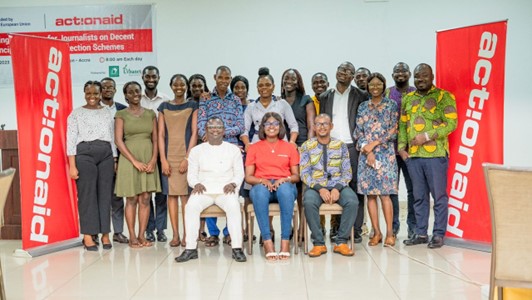… research report reveals
Awareness and acesss to existing Social Protection(SP) schemes in the country remains low among small holder farmers, and vulnerable groups in the Northern parts of Ghana and the Savannah region.
This is according to a research report conducted by ActionAid Ghana (AAG) with Tree Aid and URBANET as co-partners, and funded by the European Union under the Northern Ghana Integrated Development Project (NGIDP).
Statistically, the report indicates that only 12 and 15 percent farmers are aware of the Ghana Agriculture Insurance Programme (GAIP) and the national pension schemes respectively, adding that, the absence of high level of awareness of these schemes translates to only two percent each of the farmers accessing the national pension schemes, and GAIP.
The findings of the research were made available to journalists in Accra during a two-day training workshop organised by ActionAid Ghana, aimed at training them on SP and decent work principles to raise awareness, advocacy for the expansion of the schemes in deprived rural communities, and influence government policies on decent work at all levels.
The Communications Manager of ActionAid Ghana, Ms. Esther Ohenewaa Brown noted that beyond the low awareness, there exist an issue of wrong targeted groups in relation to SP schemes.
She explained that the beneficiaries of these government SP schemes who includes farmers and vulnerable groups, do not enjoy these opportunities rather, they are accessed by people who are connected with key politicians in the community.
“Unfortunately, it is those who are politically connected in these communities who are the ones accessing these social protection schemes. And so it means that there’s a problem in terms of the targets, in terms of the beneficiaries, because at the end of the day, the social protection policies give the right direction as to who should be the beneficiaries”, she said.
According to her, one can only identify the people who access the schemes by running a beneficiary assessment and hence, she has called on ministries such as the Gender and Social Protection, Children and Social Protection respond and conduct an impact assessment.
Ms. Brown explained that beyond the engagement with the media in using their platform to create awareness, and access to decent work and social protection for people especially in the rural areas, they also work hand in hand with state agencies, for instance, the Department of Agriculture, the Ministry of food and Agriculture (MoFA), the Ministry of Gender and Social Protection throughout the implementation of the project.
Speaking on the impact of the research findings to the state, Dr. Eliasu Mumuni, Senior Lecturer at the University for Development Studies, mentioned that it reveals the reduction margins, levels of poverty and once such issues are consistently highlighted, poverty levels will gradually reduce and there would be no need for the push or call for social protection element.
Touching on the state of decent work principles as put forth by the International Labour Organization (ILO), Dr. Mumuni noted that the working conditions of the average farmer in Ghana is not appropriate or ideal, and the earnings from their proceeds are not enough.
While he expresses positive thoughts on the country’s effort in breaking the cycle of poverty, and strict adherence to the principles of decent work, he charged District Chief Executives, Coordinating Directors, Ministers, Executive Secretaries, Directors, Agency Managers across the country to hold in trust their mandate and as such offer people the services that do not inure to the decent work principles.










